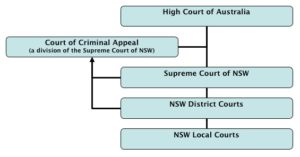Appeals
Appeals are an important part of the criminal justice system. While lawyers and judicial officers always strive to achieve the best results at first instance, sometimes an appeal will be necessary. In this section you will find information about the different types of appeals available in relation to criminal matters.
Appeals in New South Wales
An appeal is an application to a court asking the court to reconsider a decision that was made in another court or, in limited circumstances, by another government body such as Roads and Maritime Services (RMS). Avenues of appeal can be explored in order to seek a more lenient sentence, the overturning of a finding of guilt and/or conviction or because of an error of law by the decision-maker.
There are different types and forms of appeals; however, each type of appeal is only available in certain circumstances. We have provided further information in relation to the main types of appeals, and different appellate courts, below and on separate pages which can be accessed by clicking on the below links:
- Annulment of conviction or penalty imposed in the Local Court
- Appeal against Local Court Sentence
- Appeal Against Local Court Conviction
- Supreme Court of New South Wales
- Court of Criminal Appeal
- Court of Appeal
- High Court of Australia
- Dictionary to Appeals
Court Hierarchy
In order to understand how appeals work, one must understand the court hierarchy in New South Wales and Australia. An appeal against a decision of a court requires a higher court to reconsider that decision. For example, if a person wishes to appeal against a decision that was imposed in the Local Court, the appeal of that decision can be heard in the District Court. In some circumstances, an appeal against a decision of the Local Court can be heard by the Supreme Court of New South Wales.
The diagram below shows the court hierarchy in New South Wales.
The Local Court
The Local Court is the lowest court in the New South Wales court hierarchy. While all criminal matters originate in the Local Court, not all are finalised there. Whether a charge can be finalised in the Local Court will depend on the nature and seriousness of the charge.
Under its criminal jurisdiction, the Local Court deals with summary (minor and common) offences such as drink driving and disorderly conduct and certain indictable (more serious) offences that can be dealt with summarily such as assaults, property damage and fraud offences.
The vast majority of criminal cases consist of summary offences and offences that can be dealt with summarily, and thus most cases are dealt with by the Local Courts. More serious offences, called strictly indictable offences, such as murder and manslaughter, are required to be finalised in the District Court or Supreme Court. The Office of the Director of Public Prosecutions can also ‘elect’ to have certain offences be tried in the District Court or, in very rare circumstances, the Supreme Court, rather than the Local Court.
In relation to the more serious offences that are required to be dealt with by higher courts, the matter will remain in the Local Court through procedural phases, such as the service of the brief of evidence and finalisation of charge certificates before the matter is committed to the District or Supreme Court for sentence or trial.
Local Court cases are heard by a single Magistrate.
The District Court
The District Court is the intermediate court in New South Wales. Under its criminal jurisdiction, it deals with indictable offences except for murder, treason and piracy. The District Court conducts trials by jury, or in some cases trials by a Judge alone. Where a person has pleaded guilty, they will be sentenced in the District Court by a single District Court Judge.
The District Court also hears appeals from the Local Court. These are heard by a single Judge. Appeals from the Local Court include appeals against the severity of a sentence imposed in the Local Court (Severity Appeals), appeals against a conviction imposed in the Local Court (Conviction Appeal), or an appeal against both (All Grounds Appeal). These are appeals of right, meaning that the defendant does not need to demonstrate that the Magistrate made a mistake about the law, or a fact, to appeal successfully (although sometimes this can assist in succeeding in an appeal).
The Supreme Court, Court of Criminal Appeal (CCA) and Court of Appeal (CA)
The Supreme Court is the highest court in NSW. It handles the most serious criminal matters, such as treason and murder, conducting sentences for persons who have pleaded guilty and trials before a jury and in some cases before a Judge alone.
The Supreme Court can also hear certain appeals from the Local Court. The appeal must be based on an error of law by the Magistrate. You cannot appeal to the Supreme Court simply because you do not agree with the decision and you want the matter considered again.
The Supreme Court also has two separately constituted Courts – the Court of Criminal Appeal and Court of Appeal.
The Court of Criminal Appeal is the State’s highest court for criminal matters and is a special division within the Supreme Court. While a part of the Supreme Court, the Court of Criminal Appeal hears appeals from decisions of the District Court or Supreme Court.
A person who has been found guilty by a jury (or Judge if the trial was by Judge alone) or who pleaded guilty and has been sentenced by a Supreme Court or District Court Judge may appeal to the Court of Criminal Appeal. Unlike appeals from the Local to District Court, there is no absolute right of appeal and, generally speaking, an error needs to be established.
An appeal against an interlocutory decision (which is a type of preliminary ruling made by a Judge about a particular issue) of a District Court or Supreme Court Judge can be appealed to the Court of Criminal Appeal, prior to the matter being finalised. An interlocutory decision has a particular meaning and can include decisions such as whether a trial is vacated (cancelled) and adjourned or whether trials are to be separated or joined.
The Court of Appeal has a similar function for matters which are civil in nature, rather than criminal.
The High Court of Australia
The High Court is the highest court in the Australian legal system. It decides cases of special federal importance including challenges to the constitutional validity of laws and hears appeals from the highest courts of each state (for example, the NSW Court of Criminal Appeal or Court of Appeal). An appeal can only be heard by the High Court where ‘special leave’ has been granted.
A person who wishes to appeal to the High Court first has to apply for ‘special leave’ to appeal. This application is submitted in writing with supporting documents and evidence. It is heard by three Judges of the High Court and subject to strict time limits. Most applications for special leave are refused and the High Court can only hear an appeal if special leave is granted.
Where leave to appeal is granted and an appeal is heard by the High Court, the appeal will be heard by five to seven Judges of the High Court.
If you require legal advice about appeals or any other legal matter, please contact Armstrong Legal.

This article was written by Trudie Cameron
Trudie Cameron is the Principal Lawyer | Practice Leader – NSW & ACT and is responsible for supervising and managing the New South Wales Criminal Law team in addition to her own caseload. She practices in both NSW and the ACT. Trudie is an accredited specialist in criminal law, practising exclusively in criminal and traffic law. Trudie defends clients charged...


